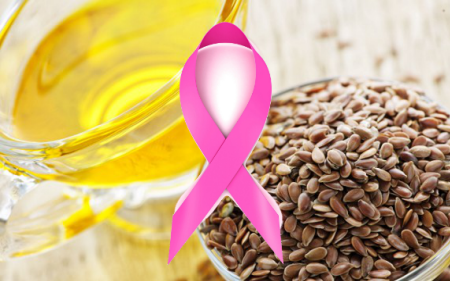|
from NaturalSociety Website
While the conventional cancer constituents would have you think “early detection” is the best weapon against breast cancer, it seems far more rational to suggest that prevention is an even more powerful weapon.
After all, preventing breast cancer means no detection is needed, no annual x-rays and no need for Big Pharma-created drugs.
There are many ways to prevent breast cancer, with one recent meta-analysis highlighting the importance of one particular food in breast cancer prevention - flaxseeds.
Flaxseed has many powerful anti-cancer properties and many that are specific to women, hormones, and the prevention of breast cancer.
The new meta-analysis (Flax and Breast Cancer - A Systematic Review) was published in a recent issue of Integrative Cancer Therapy, and investigated more than 1,800 records from various academic sources all relating to breast cancer and the effects of flax.
Among women who were recently diagnosed with breast cancer, flax was shown to increase selective cell death within the cancerous tumors, decrease the expression of a protein associated with breast cancer malignancy (HER2), decrease proliferation, and decreases in hot flashes.
Perhaps most significant, the consumption of flax was associated with an 18% reduced risk of primary breast cancer. It was also associated with a lowered death rate among breast cancer patients by 32%.
Harnessing phytoestrogenic properties and hormone changing effects, flax is often used as a solution for menopausal symptoms. But it’s these same effects that can potentially change breast cancer outcomes in women.
Unfortunately, the cancer machines (American Cancer Society, Susan G. Komen, etc.) designed to encourage cancer reactivity rather than proactivity aren’t talking about it. Instead, they’d like to discuss why we need to “raise awareness” about breast cancer and get regular screenings.
The answer to breast cancer, as in all other forms of disease, is largely found in our dietary choices.
There are anti-cancer foods whose beneficial properties we are just beginning to understand, and there are cancer-fueling foods that are dumped by the truckload into American supermarkets.
Our choice, as health conscious consumers, should be clear.
Additional Sources
-
Meta-Analysis Reveals - 22 October 2013 from WakeUp-World Website
With October being Breast Cancer Awareness month,[1] one cause that most likely won’t be marketed to us is that of women taking back control of their health by consuming more cancer-fighting foods.
In years past, Smith & Wesson’s pink hand gun and KFC’s “buckets for the cure,” [2] have made the list of approved ‘pink’ products, but nowhere does one find fund-raisers and races for better access to and consumption of the extensive list of foods that increasingly science has vetted as actually preventing and/or killing breast cancer. [3]
All the more reason why a new meta-analysis on flaxseed and breast cancer published in the journal Integrative Cancer Therapy this month is so timely.[4]
The review was no small undertaking, as it obtained its findings by sorting through 1,892 records from a variety of biomedical databases, including MEDLINE, Embase, the Cochrane Library, and AMED from inception to January 2013, concerning any available human interventional or observational data pertaining to flax and breast cancer.
They discovered the following benefits of flaxseed among newly diagnosed breast cancer patients:
Additional findings among uncontrolled and biomarker studies included:
Finally, observational data suggested the consumption of flaxseed:
The study authors concluded:
These findings, of course, are extremely valuable to women, many of whom have been wrongly lead to believe that the #1 most important step in breast cancer prevention is “early detection” via x-ray based breast screenings - as if the point is to watch and wait for the juggernaut of genetically-based cancer to unfold within their bodies, and ‘catch it early’ if you can.
Truth be told, never before have so many women been at so great a risk of unnecessary harm from breast screening, due to the millions of dollars of cause marketing propaganda that assault them year around in myriad products and services ostensibly put in place to help ‘raise awareness,’ or ‘raise money to raise awareness,’ as to why they should participate in the dangerous ritual of mammography.
Ironically, and tragically, it is now firmly established (but still widely unknown) that participating in conventional breast screenings increases breast cancer mortality, as a direct result of it generating countless cases of misdiagnosed and mistreated ‘cancer’ in healthy women every year [1.3 million causes in the U.S. over the past 30 years].
Never before have women so desperately needed an alternative path towards breast cancer prevention, beyond subjecting themselves, as a “preventive” measure, to annual or bi-annual doses of highly carcinogenic mammography radiation - a screening procedure that we now know mostly detects harmless lesions known as ductal carcinoma in situ (DCIS), and that a National Cancer Institute commissioned panel recently suggested should not even be called cancer, owing to its intrinsically harmless or indolent nature.
Flaxseed is actually only one of hundreds of natural foods, spices and substances that have proven anti-breast cancer activity, even among drug-resistant and multi-drug resistant breast cancer cell lines.
Article Resources
|


